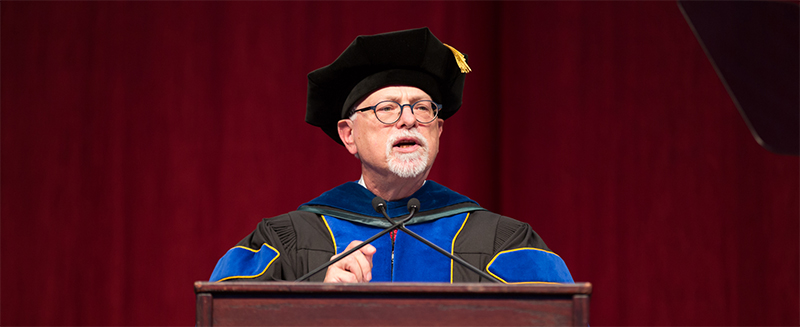Fall Commencement 2018

Before we begin the conferring of degrees, I’d like to share a few final thoughts with you. First and foremost, congratulations to you, your family, and everyone celebrating this achievement with you today. I hope you have some time to savor the moment in the days and weeks ahead.
As always, I try to put myself in your shoes as you transition into an entirely new phase of life. On the one hand, they seem like pretty comfortable shoes. You’re getting a degree from a great university – maybe even an advanced degree – which means you’re well on your way to a healthier, happier, more financially secure life. It’s been a bumpy year, but overall the economy is doing well and unemployment is low, so your immediate job prospects are pretty good, which is always reassuring.
On the other hand, those shoes might pinch in a few places. As our midterms elections showed, we’re living in perhaps the most politically divisive era since the Vietnam War – tensions are high. We’ve also got some big issues on the radar, including income inequality, increasingly dire warnings about climate change and if people like the late Stephen Hawking are to be believed, the threat of an artificial superintelligence taking over our lives.
It’s enough to keep you up at night! But I came across a quotation recently that puts some of this in perspective. And I’d like to share it with you:
“We are unsettled to the very roots of our being. There isn't a human relation, whether of parent and child, husband and wife, worker and employer, that doesn't move in a strange direction. We don't know how to behave when personal contact and eternal authority have disappeared. There are no precedents to guide us, no wisdom that wasn't made for a simpler age. We have changed our environment faster than we can change ourselves.”
It sounds like it could have been written this morning to describe disruptive new technologies and the world we find ourselves in, but in fact it comes from the book Drift and Mastery by Walter Lippmann, written in 1914. Yes, 1914. More than a hundred years ago. Lippmann was testifying to dizzying pace of industrialization, urbanization, and the outbreak of World War One. But the sentiment seems timely, particularly the last line, “we have changed our environment faster than we have changed ourselves.
He didn’t mean environment in the ecological sense as much as the sociological and economic sense. That is, the context of human interactions. You certainly hear people voicing the similar concerns today, particularly in regards to online culture and its impact on how we interact in real life – or IRL, as many of you here are fond of saying.
But to me all this speaks to the larger truth: times are always changing, seemingly too quickly, and there are always challenges looming on the horizon for each generation to face. I myself went to college at the tail end of the Vietnam era at which time the Cold War was an existential threat, particularly the ominous specter of nuclear war between the Soviets and the US. There were some scary moments, but we got through it.
And I remain optimistic we will work through our current and future problems, though I don’t want to trivialize them in any way. For example, issues like climate change are going to be toughies. All the same, I’m optimistic. I’m optimistic because pessimism and despair are no help at all – they’ve never solved a problems that wasn’t going to be solved by time anyway.
Pessimism didn’t cure polio. Pessimism didn’t fuel the civil rights movement. Pessimism didn’t get the Apollo 13 crew back or win women the right to vote in this country – hard work, ingenuity, and optimism did.
More importantly, and what speaks to the reason we are all here today, is that for whatever challenges our society or our planet faces, I believe education is and always will be the answer.
Put another way, the solutions to today’s problems almost certainly reside with you: our brightest, best trained, and most gifted citizens.
You are the way forward for our society, and our best hope of prevailing over major challenges.
You’re the ones who will create business enterprises based on innovative technologies and new breakthroughs.
You’re the ones who will provide leadership, energy and enthusiasm for change in public policies that advance social justice.
You’re the ones who will educate and shape the minds of the next generation, as well as attend to a graying generation of Baby Boomers. As a member of that generation, I thank you in advance.
You’re the ones who will write the books and articles that mold public opinion, and design the buildings and materials needed for more sustainable living.
You’ll create art that nourishes the mind, and produce the food that nourishes the body.
Year in and year out, a better future depends on the efforts of graduates like you. I believe this with all my heart. I wouldn’t be chancellor of a major university if I didn’t believe in the power of education to solve problems, increase empathy, improve lives and bring people together in shared purpose and humanity.
You have critical contribution to make in our ultimate goal – building a better world. So for all the things you will do in the years ahead, I thank you now, and I look forward to seeing your accomplishments unfold.